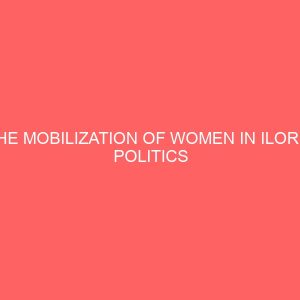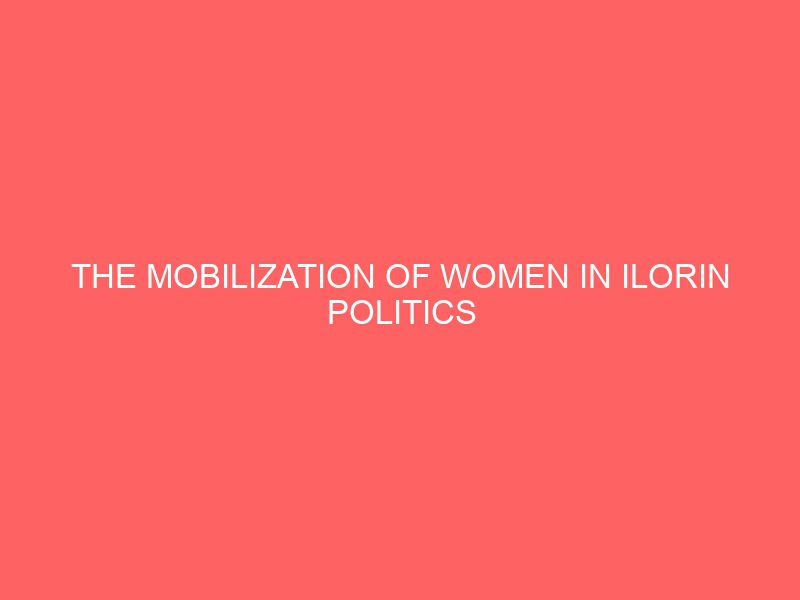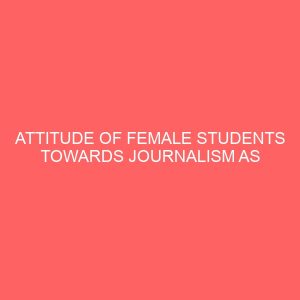Description
CHAPTER ONE
1.1INTRODUCTION
Gender incongruity in politics is a worldwide phenomenon, literature abounds showing that the level of womens participation at the highest level of political activity accounts for their invisibility in the top positions of power. Locally and internationally, such low representation cut across countries with different political systems and at different stage of economic development 1.
In Nigeria, it would appear that women have never really tested power in the realm of Nigerian politics. However, literature abounds showing womens participation in politics2. The place of women in politics during the premodern period is sufficiently familiar. The exploits of legendary women like QUEEN Aminat of Zauzau, Iyalode Efunsetan Aniwura of Ibadan, princes Inikpi of Igala and Emotan of Benin reality come to mind. During the period, women asserted and expressed themselves politically. Some women who made their mark on political scene at the colonial period in Nigeria included: Mrs Margret Ekpo of the famous Abba women riot of 1929, Madam Abibat Tinubu of Lagos and Egbaland, Mrs Funmilayo Ransome Kuti of the Abeokuta women union of 1948 and Hajia Sawaba Ganbo of Northern Element Union NEPU to mention a few. Though women enjoyed high political authority in Southern Nigeria, this was not a general Phenomenon; men had always been dominant in the political structure with women complementing them. Women activities were subordinate and supplement to the existing structure3.
In Nigeria studies show that the participation of women in democratic politics has been largely low 4. In liberal democracies, political parties, legislature assemblies and executive councils are vital sources of decision making among other power centres. Political parties in particular provide the citizens with the opportunity of participating in the management of a countrys affairs and constitute a major platform for selecting and promoting candidate for elections. They also provide avenue for mass mobilization and provision of political leadership for the Nation. Political parties also organize and share power in parliament as well as influence the decision of government and other executive bodies. Since the emergence of indigenous political leadership in 1960, Nigeria women have remained invisible in the party system. Women were grossly underrepresented in party membership as well as in decision making organs. The marginal showing of women in political parties made it difficult for a visible women party constituency to emerge or develop5.
1.2 AIM AND OBJECTIVE
Women through the ages have contributed immensely to the social and economic development of various communities world over. Their political involvement might not have been that pronounced but current womens participation in politics all over the world is witnessing tremendous increase in leaps and bounds. This is the result of the United Nation and other international bodies 19751985.
In Africa and other developing countries only a small percentage of women is actively involved in both high level politics and decision making processes. Actually, women participation in politics in the developing world is concentrated mainly in the lower echelons of public administrations, political parties and trade union. Only very few women occupy top decision making position 6.
This research work tends to evaluate the participation of women in Ilorin politics from these periods of 1979 2003, their role in politics during precolonial, colonial era as well as their mobilization groups. couple with their achievement in Ilorin between the periods of study. In discussing Ilorin politics, it is indeed necessary and vital to have a broad understanding of the area, geographical description and development that took place there in.
However, many research works have been under taken on similar subject matter which has either dealt on general politics of Kwara State and the participation of Kwara state and the participation of men. This in its own has prompted this research work.
This research work is an appraisal and objective analysis of the work, achievement of the mobilization group and their achievement of the women who venture in to politics in Ilorin.
Infact this work aimed at the activities of women in mobilization process, their impact and their role in political sphere in the development of politics in Ilorin and in Kwara State in General. This work would also examine the successes and problem of women in Ilorin politics.
Justification on the subject matter was prompted by the urge to contribute to the election of the society. It should therefore need to be discussed and documented properly. Bye and large objective of this research are conscientious study aimed at achieving a remarkable history of women mobilization for politics in Ilorin.
1.3SCOPE OF WORK
This work is basically study the participation of women in political processes in Ilorin from 19792003. This period however, in Nigeria are regarded as remarkable period and even in Kwara as whole.
1979 happened to be the period when second republic begins. After so many years of military intervention which brought to an end to the first republic in Nigeria. In 1979 the military head of State major Gen. Olusegun Obasanjo deem it fit to return the administration of the country to the civil rule. 2003 marked the first successful transition of government from civil rule to civil rule in Nigeria.
This research work is based on the mobilization of women in political terrain in respect to their achievement in pre colonial and post colonial Nigeria, such political achievement has the origin of the office of the Iyalode a chieftaincy title exclusively of women in Yoruba land and various other traditional offices in other part of the Nigeria7. The place of women in precolonial governance would be looked in to and critically examined, other aspect of women activities would not be left out.
Finally, the effect of the colonial rule in political development in various part with Ilorin as a case study couple with the eventual evolution of female active participation in politics in Ilorin .
This work is divided in to four chapters, chapter 1 is the Introduction, Chapter 2 is the Antecedent of Mobilizing women for politics, Chapter 3 is mobilizing of women in politics in ilorin from the period of 1979 to 2003, while Chapter 4 talks about the impact of womens participation in Ilorin and their general appraisal.








Reviews
There are no reviews yet.